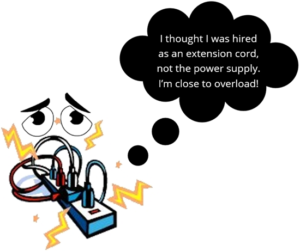By Bradford F. Spencer, Ph.D.
The opening scene from the 1991 movie Backdraft captures a heroic firefighter whose son is at a fire watching his father leap from one balcony to another as he saves a child from certain death. The father later dies in the blaze, which was caused by ARSON!
This combination of knowledge, skill, and courage glorifies the role of a firefighter and produces a great sense of satisfaction. Most firefighters have the desire to help others, make a difference, and ultimately become a hero.
Apart from saving lives, much of a firefighter’s time is spent conducting inspections, responding to false alarms, and involving themselves in other activities symbolically labeled as “polishing the engine.”
“Polishing the engine” may not be a very exciting task, but it is necessary in accomplishing the overall goal.
Why do we become managers and executives? Usually it is not because of the day-to-day activities, characterized as “polishing the engine.” We somehow believe that, in order for us to really earn our money, there needs to be a crisis.
When we think about it, most managers are paid to solve important problems and make key decisions. That is what they would like their lives to be about. When they find that they are not as needed as they would like to be, they often (unconsciously) set fires – not out of anger, but out of a need to be needed. This attention-getting behavior is an effort to make their jobs more meaningful.
We see this happen when employees withhold effort and cause problems for other departments, subconsciously making people jump through hoops.
A specific example of this is procrastination, which has a ripple effect and results in setting blazes. We may not think of it this way, but one of the subconscious reasons for procrastination is so that we are needed more. Some individuals frequently miss deadlines and then yell at people within the organization to make sure they are going to meet their customer’s needs. This need to “be important” creates internal problems; fires that will have to be put out. In these situations, they become firefighters and look like heroes to the customer, while internally ruining their reputation and costing the organization a great deal of money.
This may be exciting for these individuals because they are doing what they want to do; putting out fires and making important decisions, but the manager’s time is best spent preventing problems. Until we can find ways to systematically reinforce this in organizations, we will have to condemn ourselves for living with arson.
Symptoms of Arson:
- Most of what they do has to be done IMMEDIATELY!
- Believe their project is the most important thing in the world. Tend to be alarmists.
- Become ill so they can then work through it and suffer.
- Create unreachable standards and make everyone think that, if they do not reach the standard, the world will come to an end.
- Turn over “completed” projects that are not completed.
- Put tasks off until the last minute.
Recognition: A Fire Deterrent
A valuable point expressed by Dr. Edward Demming is that successful organizations become successful through consistent improvement in the small areas. Dr. B.F. Skinner proved that the way to alter behavior is to alter the recognition systems. Because of this, we need managers to systematically find ways within the organization to recognize the constant little improvements (the bunt singles) rather than just the home runs. By doing this, they ensure that people get satisfaction from keeping the engine in good condition. If the fire engine doesn’t run, the fires will not be put out.
“The deepest principle in human nature is the craving to be appreciated.”
– William James

